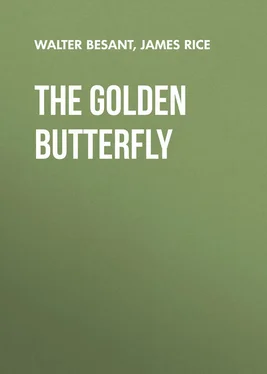Walter Besant - The Golden Butterfly
Здесь есть возможность читать онлайн «Walter Besant - The Golden Butterfly» — ознакомительный отрывок электронной книги совершенно бесплатно, а после прочтения отрывка купить полную версию. В некоторых случаях можно слушать аудио, скачать через торрент в формате fb2 и присутствует краткое содержание. Жанр: foreign_antique, foreign_prose, на английском языке. Описание произведения, (предисловие) а так же отзывы посетителей доступны на портале библиотеки ЛибКат.
- Название:The Golden Butterfly
- Автор:
- Жанр:
- Год:неизвестен
- ISBN:нет данных
- Рейтинг книги:3 / 5. Голосов: 1
-
Избранное:Добавить в избранное
- Отзывы:
-
Ваша оценка:
- 60
- 1
- 2
- 3
- 4
- 5
The Golden Butterfly: краткое содержание, описание и аннотация
Предлагаем к чтению аннотацию, описание, краткое содержание или предисловие (зависит от того, что написал сам автор книги «The Golden Butterfly»). Если вы не нашли необходимую информацию о книге — напишите в комментариях, мы постараемся отыскать её.
The Golden Butterfly — читать онлайн ознакомительный отрывок
Ниже представлен текст книги, разбитый по страницам. Система сохранения места последней прочитанной страницы, позволяет с удобством читать онлайн бесплатно книгу «The Golden Butterfly», без необходимости каждый раз заново искать на чём Вы остановились. Поставьте закладку, и сможете в любой момент перейти на страницу, на которой закончили чтение.
Интервал:
Закладка:
Probably – thought watchful Phillis, anxious to learn, – probably a custom of polite life which Mr. Dyson had neglected to teach her. And yet he always spoke with such bitterness of public-houses.
"Will you take a drop of somethink, miss?" asked the polite assistant, tapping the handles hospitably. "What shall it be?"
"I should like – " said Phillis.
"To be sure, it's full early," the man went on, "for a young lady and all. But Lor' bless your 'art, it's never none too early for most, when they've got the coin. Give it a name, miss, and there, the guvnor he isn't hup, and we won't chalk it down to you, nor never ask you for the money. On'y give it a name."
"Thank you very much," said Phillis. "I should like to have a cup of tea, if I could take it outside."
He shook his head, a gesture of disappointment.
"It can't be had here. Tea!" – as if he had thought better things of so much beauty – "Tea! Swipes! After all, miss, it's your way, and no doubt you don't know no better. There's a Early Caufy-'ouse a little way up the street. You must find it for yourself, because the dawg he don't know it; knows nothink about Tea, that dawg. You go out, miss, and Cæsar he'll go to."
Phillis thanked him again for his attention, and followed his advice. Cæsar instantly got up and sallied forth with her. Instead, however, of returning to the square, he went straight on down Carnarvon Street, still leading the way. Turning first to the right and then to the left, he conducted Phillis through what seemed a labyrinth of streets. These were mostly streets of private houses, not of the best, but rather of the seediest. It was now nearly seven o'clock, and the signs of life were apparent. The paper-boy was beginning, with the milk-man, his rounds; the postman's foot was preparing for the first turn on his daily treadmill of doorsteps and double knocks. The workmen, paid by time, were strolling to their hours of idleness with bags of tools; windows were thrown open here and there; and an early servant might be seen rejoicing to bang her mats at the street-door. Phillis tried to retain her faith in Cæsar, and followed obediently. It was easy to see that the dog knew where he was going, and had a distinct purpose in his mind. It was to be hoped, she thought, that his purpose included a return home as soon as possible, because she was getting a little tired.
Streets – always streets. Who were the people who lived in them all? Could there be in every house the family life of which Mr. Dyson used to tell her – the life she had never seen, but which he promised she should one day see – the sweet life where father and mother and children live together and share their joys and sorrows? She began to look into the windows as she walked along, in the hope of catching a hasty glance at so much of the family life as might be seen so early in the morning.
She passed one house where the family were distinctly visible gathered together in the front kitchen. She stopped and looked down through the iron railings. The children were seated at the table. The mother was engaged in some cooking operations at the fire. Were they about to sing a hymn and to have family prayers before their breakfast? Not at this house apparently, for the woman suddenly turned from her occupation at the fire and, without any adequate motive that Phillis could discern, began boxing the children's ears all round. Instantly there arose a mighty cry from those alike who had already been boxed and those who sat expectant of their turn. Evidently this was one of the houses where the family life was not a complete success. The scene jarred on Phillis, upsetting her pretty little Arcadian castle of domestic happiness. She felt disappointed, and hurried on after her conductor.
It is sad to relate that Cæsar presently entered another public-house. This time Phillis went in after him with no hesitation at all. She encountered the landlord in person, who greeted the dog, asked him what he was doing so early, and then explained to Miss Fleming that he was accustomed to call at the house every day about noon, accompanied by two gentlemen, who had their little whack and then went away; and that she only had to go through the form of coming and departing in order to get Cæsar out too.
"Little whack," thought Phillis. "Little glass! What a lot of customs and expressions I have to learn!"
For those interested in the sagacity of dogs, or in comparative psychology, it may be noted as a remarkable thing that when Cæsar came out of that second public-house he hesitated, as one struck suddenly with a grievous doubt. Had he been doing right? He took a few steps in advance, then he looked round and stopped, then he looked up and down the street. Finally he came back to Phillis, and asked for instructions with a wistful gaze.
Phillis turned round and said, "Home, Cæsar." Then, after barking twice, Cæsar led the way back again with alacrity and renewed confidence.
He not only led the way home, but he chose a short cut known only to himself. Perhaps he thought his charge might be tired; perhaps he wished to show her some further varieties of English life.
In the districts surrounding Bloomsbury are courts which few know except the policeman; even that dauntless functionary is chary of venturing himself into them, except in couples, and then he would rather stay outside, if only out of respect to a playful custom, of old standing, prevalent among the inhabitants. They keep flower-pots on their first and second floors, and when a policeman passes through the court they drop them over. If no one is hurt, there is no need of an apology; if a constable receives the projectile on his head or shoulder, it is a deplorable accident which those who have caused it are the first to publicly lament. It was through a succession of these courts that the dog led Phillis.
Those of the men who had work to do were by this time gone to do it. Those who had none, together with those who felt strongly on the subject of Adam's curse and therefore wished for none, stayed at home and smoked pipes, leaning against the doorposts. The ideal heaven of these noble Englishmen is for ever to lean against doorposts and for ever to smoke pipes in a land where it is always balmy morning, and where there are "houses" handy into which they can slouch from time to time for a drink.
The ladies, their consorts, were mostly engaged in such household occupations as could be carried on out of doors and within conversation reach of each other. The court was therefore musical with sweet feminine voices.
The children played together – no officer of the London School Board having yet ventured to face those awful flower-pots – in a continuous stream along the central line of the courts. Phillis observed that the same game was universal, and that the players were apparently all of the same age.
She also remarked a few things which struck her as worth noting. The language of the men differed considerably from that used by Mr. Dyson, and their pronunciation seemed to her to lack delicacy. The difference most prominent at first was the employment of a single adjective to qualify everything – an observance so universal as to arrest at once the attention of a stranger. The women, it was also apparent, were all engaged in singing together a kind of chorus of lamentation, in irregular strophe and antistrophe, on the wicked ways of their men.
Rough as were the natives of this place, no one molested Phillis. The men stared at her and exchanged criticisms on her personal appearance. These were complimentary, although not poetically expressed. The women stared harder, but said nothing until she had passed by. Then they made remarks which would have been unpleasant had they been audible. The children alone took no notice of her. The immunity from insult which belongs to young ladies in English thoroughfares depends, I fear, more upon force of public opinion than upon individual chivalry. Una could trust herself alone with her lion: she can only trust herself among the roughs of London when they are congregated in numbers. Nor, I think, the spectacle of goodness and purity, combined with beauty, produce in their rude breasts, by comparison with themselves, those feelings of shame, opening up the way to repentance, which are expected by self-conscious maidens ministering in the paths of Dorcas.
Читать дальшеИнтервал:
Закладка:
Похожие книги на «The Golden Butterfly»
Представляем Вашему вниманию похожие книги на «The Golden Butterfly» списком для выбора. Мы отобрали схожую по названию и смыслу литературу в надежде предоставить читателям больше вариантов отыскать новые, интересные, ещё непрочитанные произведения.
Обсуждение, отзывы о книге «The Golden Butterfly» и просто собственные мнения читателей. Оставьте ваши комментарии, напишите, что Вы думаете о произведении, его смысле или главных героях. Укажите что конкретно понравилось, а что нет, и почему Вы так считаете.












